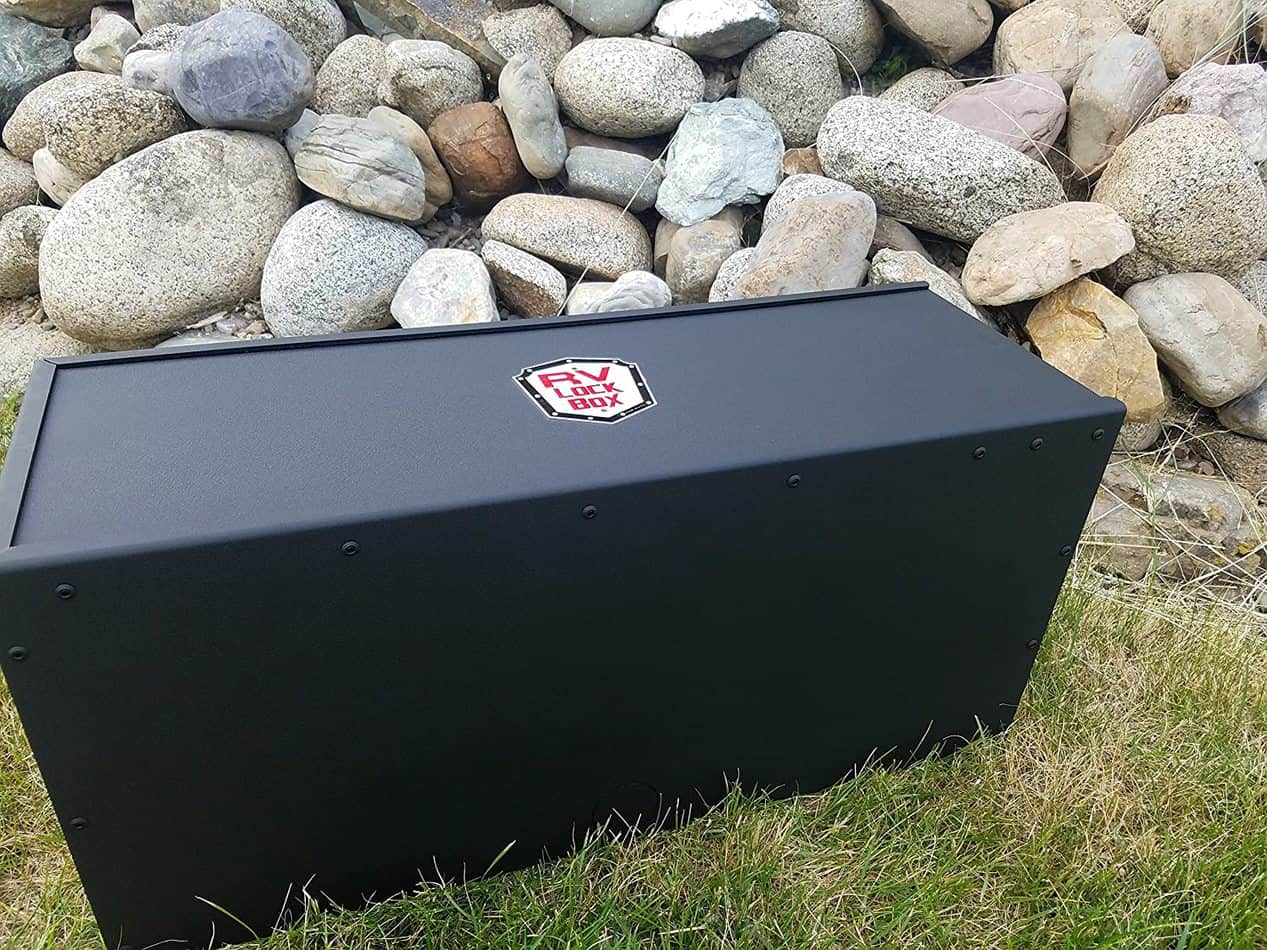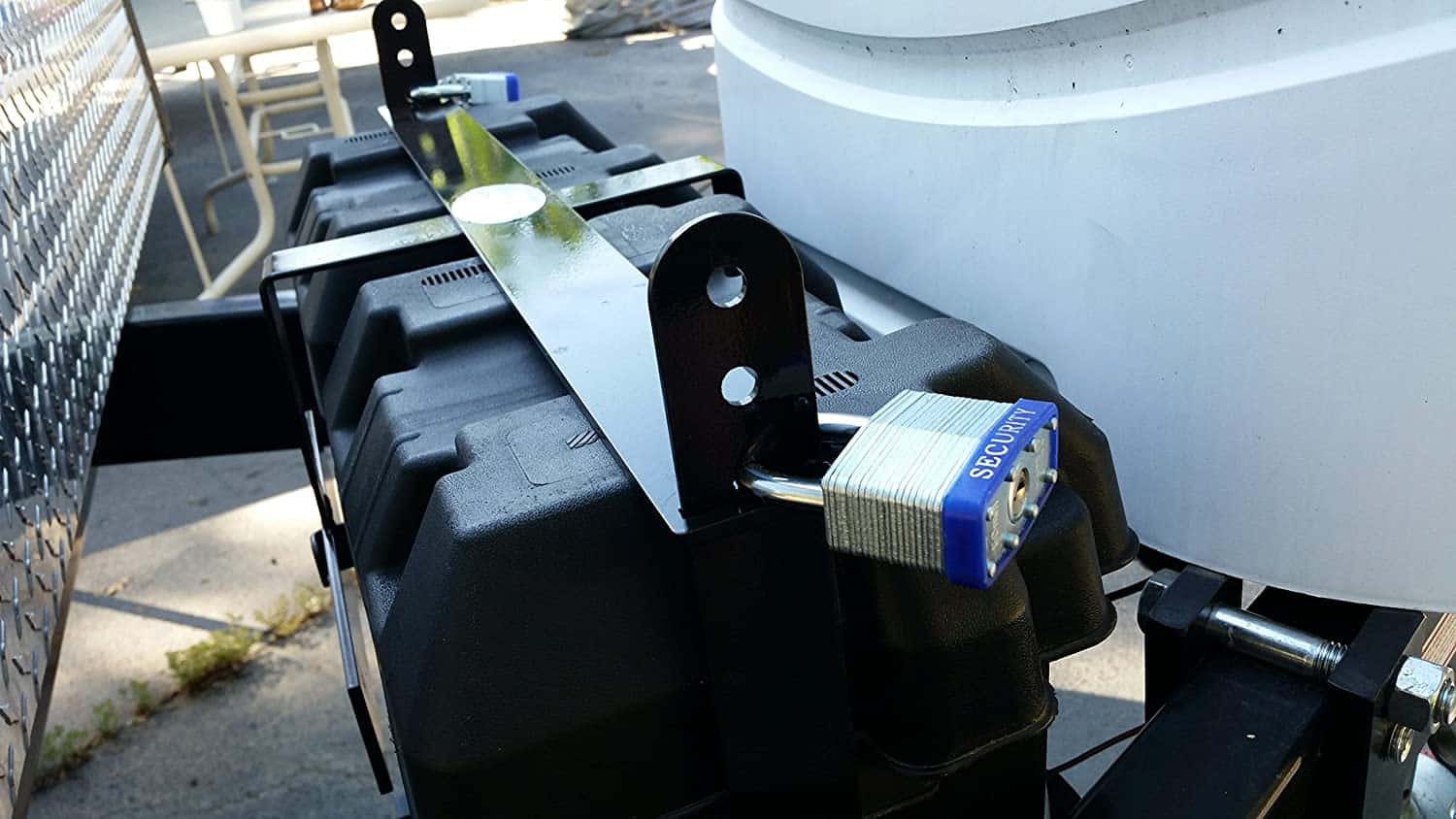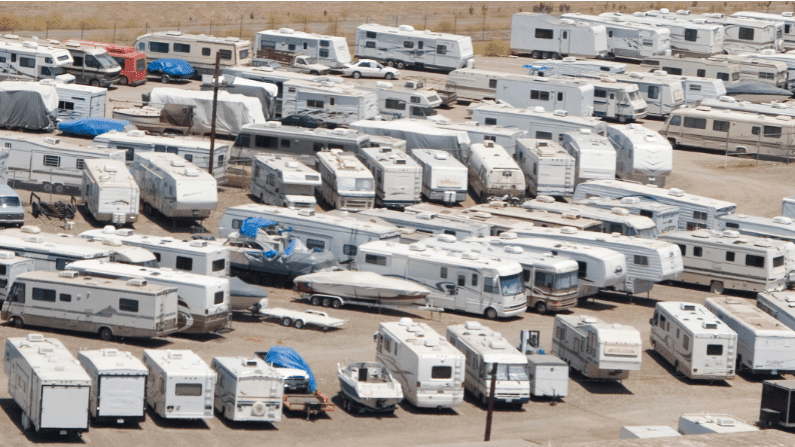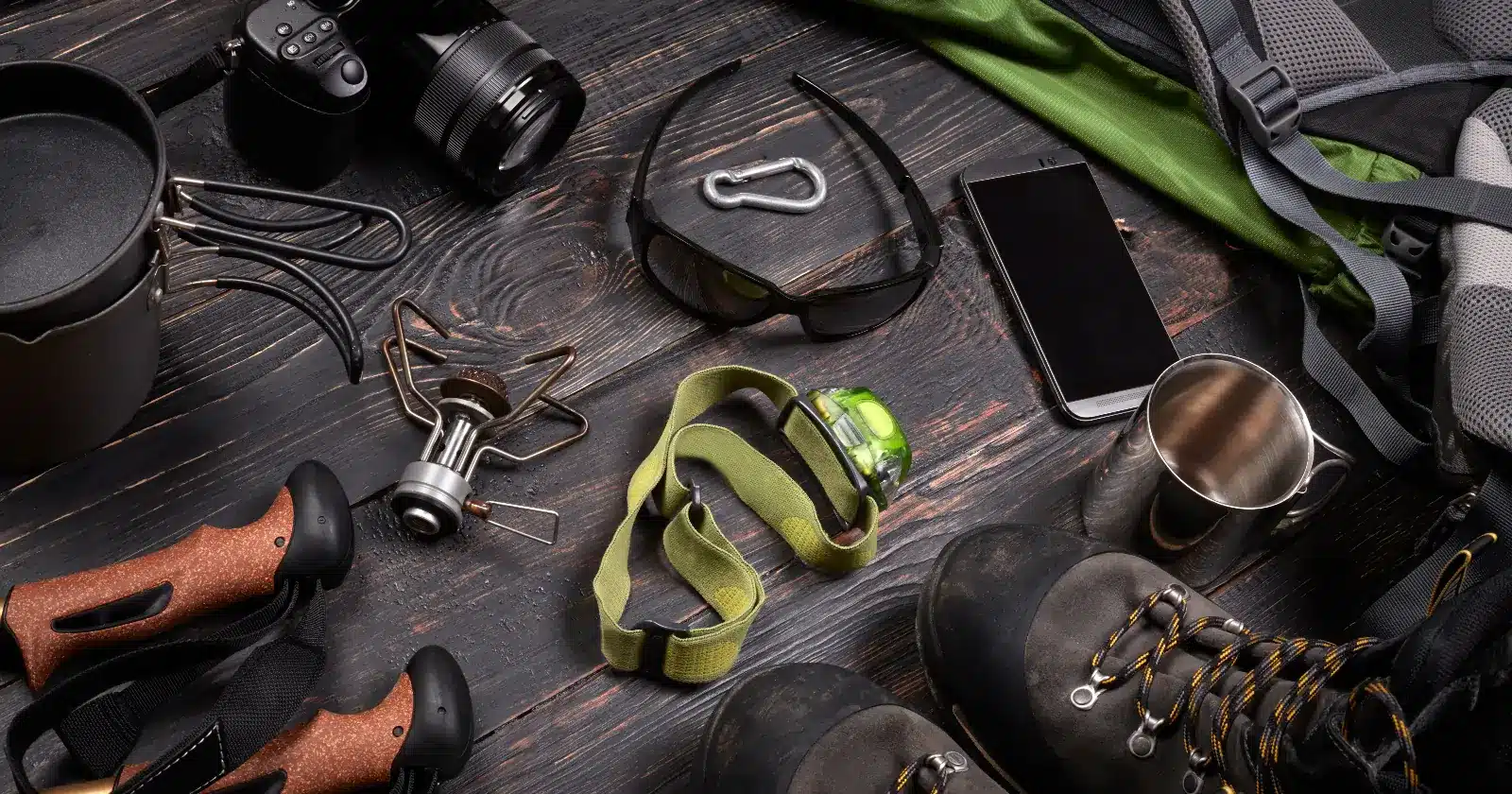Anything worth money runs the risk of being stolen – RV batteries are no exception. If you’ve shopped for an RV battery recently, you know that they range from “not cheap” to “super-duper expensive.” You definitely don’t want anyone walking away with yours. So, do you need an RV battery lock?
A battery box combined with a battery lock will lower the chances that a thief will manage to get their hands on yours. At the very least, it will keep an honest person honest.
Whether you really need a battery lock or not will depend on what type of RV you have and where you store it when it’s not in use. We’ve put together a guide on RV battery locks to help you decide if you need one and what’s the best type for you.
What Recreational Vehicles Need Battery Locks?
 Source: Unsplash
Source: UnsplashNot every RV or trailer owner needs to worry about getting a lock for their battery because not all RVs have their battery located where someone can (easily) steal it. Motorhomes and campervans will have the battery located under the hood, so it’s unlikely that these will be stolen. Batteries in fifth-wheels are usually already locked away in a secure compartment.
That means that RV battery boxes and locks are most helpful for those RVers hauling a travel trailer. On trailers, the battery typically sits between the trailer and your vehicle, making it the easiest option for thieves looking to snag one. While batteries could be stolen while you’re using the trailer, the most important time to think about securing them is when your travel trailer is in storage.
What is an RV Battery Lock?
An RV battery lock is used to prevent the theft of your RV battery. It can be chains, cables, or brackets or used in conjunction with a battery box.
Another option is to mimic the fifth-wheel setup and move the battery to a secured compartment on your trailer. Choosing a configuration for your trailer will depend on how many batteries you have, where you prefer to store them, and what equipment you already own.
Pros and Cons of Battery Locks
RV batteries can get extremely expensive, with some costing hundreds of dollars (looking at you, lithium-ion batteries). If you have two of them, that could easily be over a thousand dollars worth of batteries for your RV.
The main pro of having a battery lock is preventing someone from stealing it. Unfortunately, not all insurance options cover battery theft, so it’s best to avoid that disaster altogether. Lockboxes also protect batteries from the elements.
The pros of having some sort of locking system on your battery far outweigh the cons. That being said, depending on which lock you go with, you might have to spend a decent amount of money upfront. Aside from upfront costs, battery locks can also slow down your access to batteries.
Types of RV Battery Locking Systems
There are many different types of RV battery locking systems.
RV Battery Lock Box

An RV battery box is a heavy-duty container that works to both protect your battery from the elements as well as sticky fingers. They are usually made of polypropylene, aluminum, or other non-corrosive materials. While many battery boxes are designed with security in mind, some are only for storage, so make sure to read the specs on individual options when shopping.
A lockable RV battery box for a travel trailer is a good option because it hides what is inside. However, people familiar with trailers will know right away that they house a battery or two. They are typically accessed with a key, so they are easy to lock and unlock, but others may require the addition of a battery box lock strap.
RV Battery Lock Bracket

You can get similar security with an RV battery lock bracket if you don’t want a bulky lockbox on your trailer tongue. There are various options that will work based on what batteries you have. Some styles create a metal cage around the battery, while others fit snuggly across it. The brackets can be secured using padlocks so that no one will be able to remove them.
One popular RV battery lock bar is the Battery Shackle. They make heavy-duty locks for single or double battery setups. They even offer a similar product to secure your propane tanks in the same manner.
Chains or Cables as RV Battery Locks
While there are tons of options on the market for specialized RV battery lock systems, you can easily make a DIY RV battery lock. Use any type of chains or cables to secure your RV lockbox or lock down the battery to the trailer tongue. By crafting your own lock, you can save some money.
Moving the Battery to a Secured Compartment
If you have large or multiple batteries, you might need more space altogether. You could potentially move your battery system to one of the secured storage areas in your trailer. If you decide to go this route, you may want to get help from a specialist. Certain batteries require proper ventilation and storage to prevent dangerous off-gassing or corrosion.
On top of giving you more space, this option hides the batteries from potential thieves. If they don’t know where your battery is located, they will have a much harder time stealing it from you.
Other Safety Measures You Can Take to Prevent Theft

While all of these RV battery lock options can help prevent someone from stealing your battery, you may still want to take things a step further. These options are great for security while using your trailer or having it parked in public somewhere. However, if you decide to store your trailer for long periods of time, it’s best practice to take the battery with you.
Trailer storage areas are often not as safe as we would like them to be. If you take your battery back home, you’ll nearly eliminate the chances of it being stolen. You can also monitor its charge and keep it indoors where the extreme cold won’t damage it. This is recommended for those storing travel trailers as well as motorhomes and fifth-wheels.
Do you have an RV battery lock? Which method do you use? Let us know in the comments!





In my Class A motorhome both the House and coach batteries are in an unlocked basement storage compartment on a shelf just above the propane tank. The compartment must remain unlocked due to the propane tank, but the batteries can be locked. I fabricated an expanded metal panel that covers the batteries which is held in place with a combination padlock. All locks are deterrents as they can be cut in minutes with a battery powered cutoff grinder or a bolt cutter… but it helps to drive the potential thieves to an easier target.
5th wheel trailers usually never have locks on compartment doors, so add a good padlock to the retaining straps. Also, replace locks on the doors as well.
If a thief can get the compartment door open then “surprise” them with a 2 nd.
deterrent that is much more difficult to remove. They just might walk away.
I have used this system for 12 years with no problems, although, the fire dept.
doesn’t condone it.
Mine is locked in a compartment in my fifth wheel but I also lock my propane tanks because they will walk away also.
I have a double battery box using 2 cable straps.
The last lock idea was a good one-thanks. 5 bucks is a bargain.
I have 2 group 27 batteries in box’s . I run a chain around each one , bolt it in the frame so it can’t be moved around and tightly padlock each one. This leaves them a little tight area to work and they will move on to a easier one, Another trick I do to keep my spare tire safe is to “USE TIRE PLUGS “ TO DETOUR THEM . I take a 3/8 piece of the plug and superglue one in the treads and one on the sidewalls. No one is taking a plugged tire on the sidewall. Just food for thought. 😎
I use a python cable lock on my TT battery as mentioned in the article, just behind my locked propane tanks.
I have a basic exposed (in a plastic box) battery on the front of our 2017 Starcraft AR-One travel trailer. While we live in a very safe, low-crime neighborhood, I discovered one morning that the plastic cover had been removed and one cable disconnected before, apparently, the thief was scared off. I purchased an inexpensive “adjustable” Master brand cable lock that allows one to pull the cable as tight as possible. That seems to have done the trick. Easy to install and remove. Should deter all but the most determined thieves.
OK to lock your battery(s) but if you have an electrical fire in your trailer and your battery(s) are in a locked enclosure it would be wise to have an external battery switch. This will enable you to to kill the power immediately and eliminates lost time looking for your lock keys in an emergency to unhook battery connections.
As for locking propane tanks, never lock the compartment; the shutoff valves should be readily accessible in the event of an emergency. I recommend locking the tanks to the RV structure with chain, cable or metal brackets.
Great article. Thanks for the information.
Old Harley buddy was a professional locksmith. Favorite saying was, “Locks keep the honest, kids, and the terminally stupid out.” Locks might slow down the thief, and possibly encourage him to move on to easier pickings. But, if he wants it, it’s gone. Locks and safes provide the owner an illusion of security.
I just use a Camco box with locking lid. Box bolted to hitch battery tray on travel trailer. Not much protection, but it’s only a single lead acid. I’m more worried about my e-moto bike 52 volter triangle battery- it set me back $325.
You mean there is a question on t? I have no question on it, rather that was my intention from the beginning. It’s only common sense. But NOT to buy a battery box, that is strictly a DIY project as far as I am concerned, out of the heaviest angle iron available. If you want to go DIY and can’t weld, no problem, find a welder and have him do it.
We have a double battery box on the front of our TT. I formed plumbers’ tape tight around the box at two locations, put s bolt through a hole where the tape came back together and double nutted the bolts.